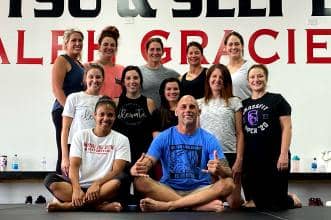Jiu Jitsu & Self-Defense Classes
Self Defense Classes
Get the skills you need in today's world.
Self Defense Classes
Our self-defense classes are geared toward people who generally have no formal training in martial-arts, fighting, or self defense. Classes are designed to provide you with practical self-defense skills and the self confidence to protect yourself. The general idea of self-defense classes is learning how to handle threatening situations and reduce personal harm.
Classes are 60 minutes long and include a warm-up, specific technique practice with same-level partners, and supervised skill drills. For people who want to develop a higher level of self-defense skills we recommend taking our adult classes to learn Jiu Jitsu, Judo, and elements of other forms of martial arts.
Classes are 60 minutes long and include a warm-up, specific technique practice with same-level partners, and supervised skill drills. For people who want to develop a higher level of self-defense skills we recommend taking our adult classes to learn Jiu Jitsu, Judo, and elements of other forms of martial arts.
Want to try it out? Contact us for a FREE Self-Defense Class
Why Do Self Defense Classes?
Our Jiu-Jitsu self-defense classes, also known as Brazilian Jiu-Jitsu (BJJ) self-defense classes, are specialized martial arts training programs. Our classes are designed to teach you how to defend yourself in real-life situations using the techniques and principles of Brazilian Jiu-Jitsu. These classes are typically designed to help students develop realistic self-defense skills, improve physical fitness, and boost confidence. Here's a description of what you can expect from such classes:
- Techniques and Principles: Jiu-Jitsu self-defense classes emphasize the core techniques and principles of BJJ that can be applied to self-defense scenarios. These techniques include joint locks, chokes, throws, and ground control tactics.
- Realistic Scenarios: Instructors create scenarios that simulate real-life self-defense situations, such as escaping from a headlock, defending against multiple attackers, and dealing with common street-level threats. This practical approach helps students learn how to respond effectively in high-pressure situations.
- Escapes and Control: Students are taught how to escape from various holds, grabs, and positions, including those that occur in close-quarters situations. They also learn how to control and immobilize opponents if necessary, without causing unnecessary harm.
- Self-Defense Mindset: In addition to physical techniques, self-defense classes often emphasize the importance of situational awareness, de-escalation, and understanding the legal and ethical aspects of self-defense.
- Hands-On Drills: To ensure that students can apply what they've learned, classes often include sparring (rolling) sessions where they practice against resisting partners. These sessions help build confidence and improve reaction times.
- Physical Fitness: Jiu-Jitsu self-defense classes can be physically demanding and are an excellent way to improve overall fitness. They can help enhance strength, flexibility, endurance, and cardiovascular health.
- Confidence and Self-Esteem: As students become proficient in self-defense techniques, they often experience increased self-confidence and self-esteem, knowing they have the skills to protect themselves in dangerous situations.
- Self-Defense Awareness: These classes also teach participants how to recognize potentially dangerous situations and how to make smart choices to avoid conflicts when possible.
- All Skill Levels: Jiu-Jitsu self-defense classes are generally open to people of all ages and fitness levels. Instructors often tailor the instruction to meet the needs and abilities of their students.
- Community and Respect: Jiu-Jitsu schools often emphasize a strong sense of community, respect for others, and a code of conduct. This helps create a positive and inclusive learning environment.
Overall, our Jiu-Jitsu self-defense classes provide valuable skills and knowledge that can prepare you to protect yourself and others. Through learning practical techniques and defense strategies that can be applied in real-world self-defense situations you will be better prepared for unexpected threatening situations.

FREE Self-Defense Class!
Find out what you've been missing with a FREE class. Absolutely no pressure to sign up or need for special gear. We've got you covered. Contact Us
